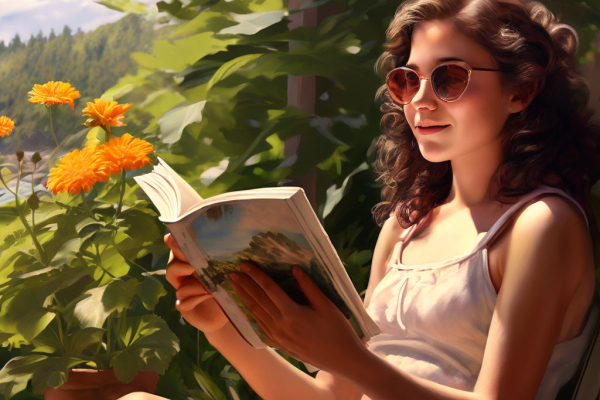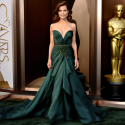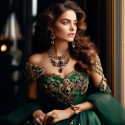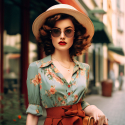Summer Read-List 2024

We've decided to compile all the books We've read this summer into one comprehensive post since I haven't had time to write separate reviews, and Facebook followers have been asking about them. Besides, We've already lined up a new list of books for the fall, which I'll be writing about next time. So, here's a roundup of the books We read this summer:
Irwin Shaw, Two Weeks in Another Town
This book falls into the classic genre where the protagonist travels to another city/country, experiences personal growth, and encounters various challenges that help him redefine himself. In this case, the main character arrives in Rome to assist his friend in finishing a film. He is a former movie star who, after a war injury, can no longer act and seemingly doesn't regret it much. Throughout the book, we learn about his personal dramas and a brief romance with a local girl. I won't spoil the plot, but overall, it's a fairly typical story of "middle-aged man seeks self-discovery in a new place." While Irwin Shaw is a master storyteller, I couldn't shake the feeling that this was a distinctly male-centric narrative focused on male self-discovery. I found myself more intrigued by the background heroines, such as the wife left behind with the children while the protagonist experiences adventures in Rome. If viewed from a slightly different angle, though, the book offers plenty of food for thought beyond just being a good read.
Lucid Dreaming: What Your Brain Is Trying to Tell You?
An excellent book on working with your dreams. It's light on mysticism but heavy on practical exercises. You need to be quite diligent to follow them all (like recording your dreams in a specific format every morning). However, if you immerse yourself in this routine, you'll learn to recognize specific signals your brain sends during sleep. It's not just a dream dictionary; it's a practical toolkit for interacting with yourself.
Olga Savelieva, Orange Peels: A Candid Story of Growing Up
They say everyone can write a captivating book if it's about their childhood. Indeed, childhood experiences vary widely, yet we often find many shared details in each other's stories. These similarities bring us joy in recognizing others' memories. It's even more interesting to read about how, despite such similarities, everything was still different for others. Olga Savelieva's story is quite standard: an alcoholic father, a girl growing up with her grandmother, tales of school, clubs, long hair, and relationships with loved ones. And about what kind of mother Olga herself has now become. I don't know how much truth there is in this book. In such literature, it's often hard to separate the author from the lyrical hero (if there is one at all). But I'm not sure that's necessary. The book is easy and quick to read, a few hours of immersion in someone else's childhood. And for the author, it seems writing this book became a kind of therapy. It's interesting to see and realize this too.
Anne Tyler, A Spool of Blue Thread
I saw a quote from this book on a friend's page and realized I had to read it. An unusually engaging format for a family saga is presented in a relatively concise form. It's not the three-volume detailed description of every detail of family relationships. Nevertheless, the life of one family is fully described before us, like a crumbling puff pastry, revealing new layers of filling. It's fascinating how some family events are portrayed differently by different participants. For example, when a woman describes her relationship with her husband as unearthly passion, and the man talks about how he couldn't detach himself from her, but then just got used to it. The theme of adoption is touched upon, specifically how it affects other children in the family and how they feel compared to the adopted child. To say more about this book would mean to spoil the plot twists for you, and it would ruin the whole impression. So take it and start reading yourself.
Stephen King, On Writing: A Memoir of the Craft
I'm not actually a big fan of King's work. I've seen a few movies based on his works and read even less. Nevertheless, this book definitely captivated me, and I even wanted to read more of his science fiction. This book is something between a practical guide to writing style and memoirs. The memoir part is particularly fascinating because the stylistic advice is based on English examples, and even though the translator tried hard, we can only partially relate them to our linguistic background. But the memoir part is wonderful. In it, King talks about school, launching his first newspaper with his brother, relationships with his wife, and publishers. And a lot more. So, even if you don't plan to write anything and aren't a fan of Stephen King's prose — I still recommend reading this book because it's just an incredibly fascinating story of a significant life. And yes, of course, in terms of lexicology, this book goes as 18+, but I've already recommended it to my twelve-year-old son. Because a few curse words are nothing compared to the motivation and inspiration you can get from these pages. And for a teenager, this is important as never before.
Alice Munro, Dear Life
Alice Munro is considered a master of the short form, and this collection of stories fully demonstrates this. What's important here is that these are stories about girls and women, written by a woman. Lately, I've always paid attention to this. What's also notable is that Munro's stories are very simple in terms of plot. Sometimes it seems like there's barely any plot at all. It's just an ordinary evening in an ordinary woman's life, for example. There's no drama, no emotional escalation, or an amazing ending. It's just someone's life or memories written down on paper. I really liked it: it's easy to read and leaves a pleasant aftertaste. And this narrative "blurriness" actually leads us to pay more attention to the characters' emotions and the small details of their lives.
Ray Bradbury, Let's Kill Constance
Everyone knows Bradbury as a science fiction writer. But his detective stories are a whole different story. I would even say that these are not quite detectives in the classical sense, but rather some semi-mystical stories through which the reader sometimes has to literally make their way. There's no simple resolution here and no conclusion that the murderer is a gardener. No. There's very little said directly here, and you have to build the picture of what's happening in your mind based on snippets of dialogue from the characters. Nevertheless, it's very exciting and captivating reading.









